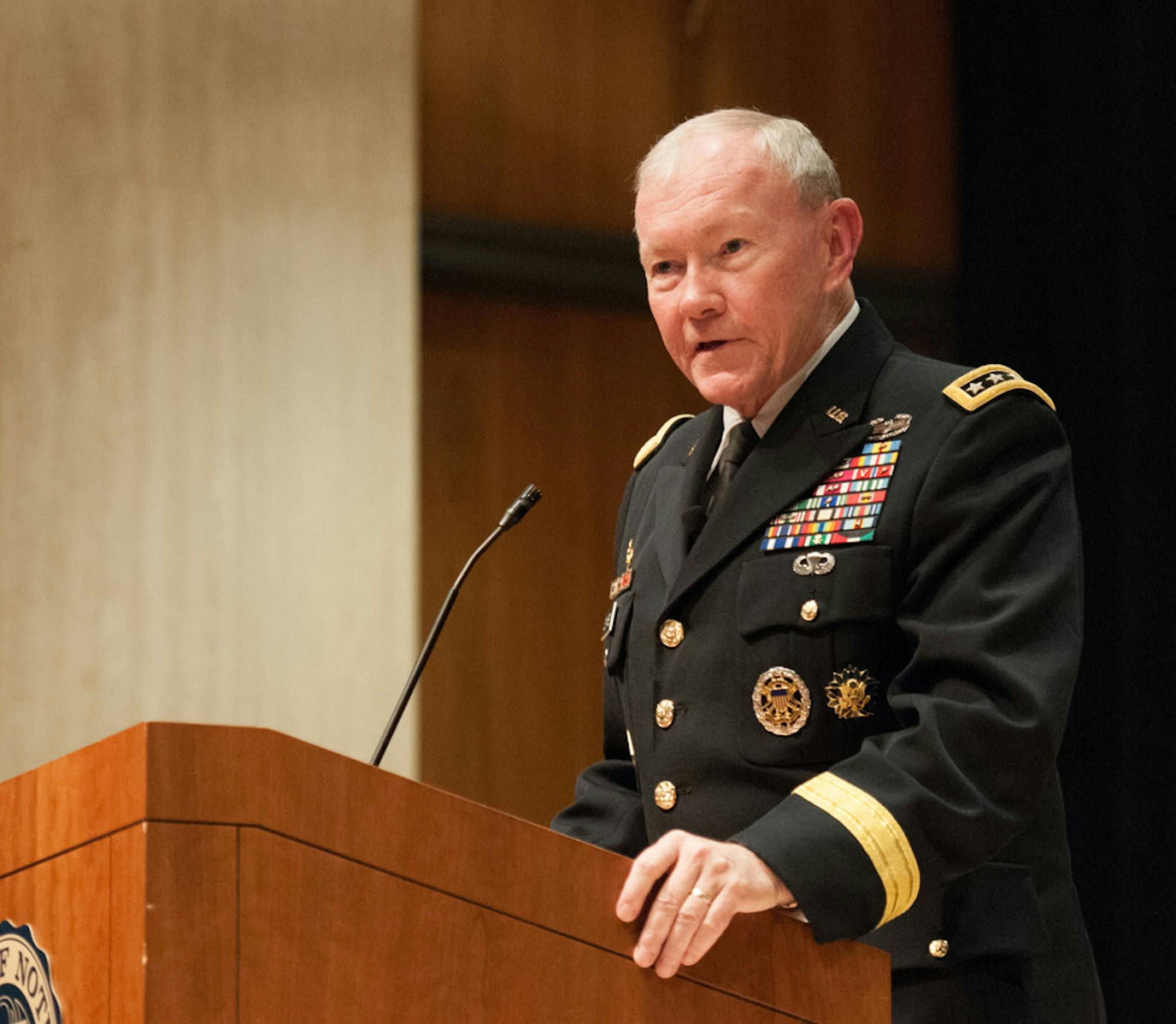Chairman of the Joint Chiefs of Staff Gen. Martin E. Dempsey, the nation’s highest ranking military officer, came to Notre Dame on Saturday to deliver the Jack Kelly and Gail Weiss Lecture in National Security and address America’s most crucial national security issues.
Dempsey spoke to a standing-room-only crowd in the Carey Auditorium of the Hesburgh Library for approximately 20 minutes before taking questions from the audience for another 40 minutes. In his prepared remarks, he broke down America’s security challenges into two “heavyweights,” China and Russia, two “middleweights,” Iran and North Korea, two networks of violent extremism and trans-national organized crime and one cyber domain.
“You’ve heard a lot about our rebalance to the Pacific,” he said. “That’s not a choice, frankly, it’s an imperative. … By 2050, there will be nine billion people on the planet. Seven billion of them will live between China and India.
“We’ve got to rebalance our efforts to the Pacific. The question is how quickly and how, and it’s not just military. … We’ll eventually do that, [but] it’s hard to do that when you’re thinking about the ISIS threat or about a reasserting Russia in Europe. It is imperative.”
In Iran, Dempsey said the U.S. must address more than just Iranian nuclear ambitions.
“What gets most of the notoriety is Iran’s nuclear aspirations,” he said. “You’re well aware of the negotiations that are ongoing to try to diplomatically and economically … convince Iran that it would not be in their best interest. We’re making some progress.
“It’s not just about nuclear weapons with Iran. They are [also] one of the world’s leading exporters of arms.”
With 28,000 soldiers on the Korean peninsula, Dempsey said that region is also a primary security priority.
“The security of the peninsula is not just a matter of an alliance obligation, it’s also the fact that we have enormous economic ties to South Korea,” he said. “We’ve got a huge stake in maintaining stability on the Korean peninsula in supporting our Republic of Korea allies. That got harder when the youngest leader on the planet became the leader of [North Korea]. He’s an erratic fellow, and he’s unpredictable.
“We’ve got our eye on [North Korea] and we’re using all of the instruments of military and national power … to make sure North Korea doesn’t achieve its intentions.”
Dempsey said ISIS presents the most attention-grabbing current threat to American security, but is part of a larger issue.
“[ISIS is] part of a network of radical movements that use terrorism as a tactic,” he said. “We kind of lump them in and say they’re all terrorism, but they’ve all got different agendas. They work together when it suits their need, and they don’t when it doesn’t, and you can’t paint them all with one brush.
“As we look at these threats in the Middle East, notably from radical Islamists … you just have to be very thoughtful about it so we apply the right tool at the time and over the right length of time in order to make the difference.”
The international criminal network, Dempsey said, may present more of an ultimate threat to American security, though it does not receive as much attention as terrorist networks.
“[The transnational organized criminal] network might actually be more dangerous at the end of the day, though it’s hard to make that case,” he said. “That network is often thought of, in policy terms, as a drug network, [but] it’s more than just a drug network. It’s a railroad, and you know a railroad will carry whatever it is paid to carry. It’ll carry drugs, it’ll carry arms, it’ll carry unaccompanied children, it’ll carry weapons of mass destruction, it’ll carry terrorists.
“In that network there is a connection between the incredible money generated by that network into the terrorist networks I described before. It’s hard for us to actually track it. … One of the things we have difficulty seeing is the connection between the financial power of this criminal network and the power … and ideology of the terrorist network. But that connection is there and we continue to learn more about it and frankly we haven’t done enough against that network.”
Dempsey said the cyber domain, while providing a wealth of information and connectivity, poses a potential issue for national security.
“Cyber is among the most misunderstood words, I think, in the American English language,” he said. “We love it because it empowers us and it provides us with information that is mind-numbing.
“Now you’re connected all the time, everywhere, with access to almost everything, and that’s wonderful. In so doing, you have exposed some of your privacy, and I think you know that. But, we’ve got issues at the national level of trying to understand and reconcile several of our values: freedom of information, privacy and security. … Frankly, we’ve made modest progress, but not nearly enough progress on [security standards and information sharing].”
Dempsey also took audience questions on future risks to American security, potential ways to dismantle ISIS, Russia’s use of military force in Ukraine and advice for ROTC cadets in attendance. To the cadets, he said to pay attention to the development of democracy and never forget that their commitment is not to themselves, but to their country.













